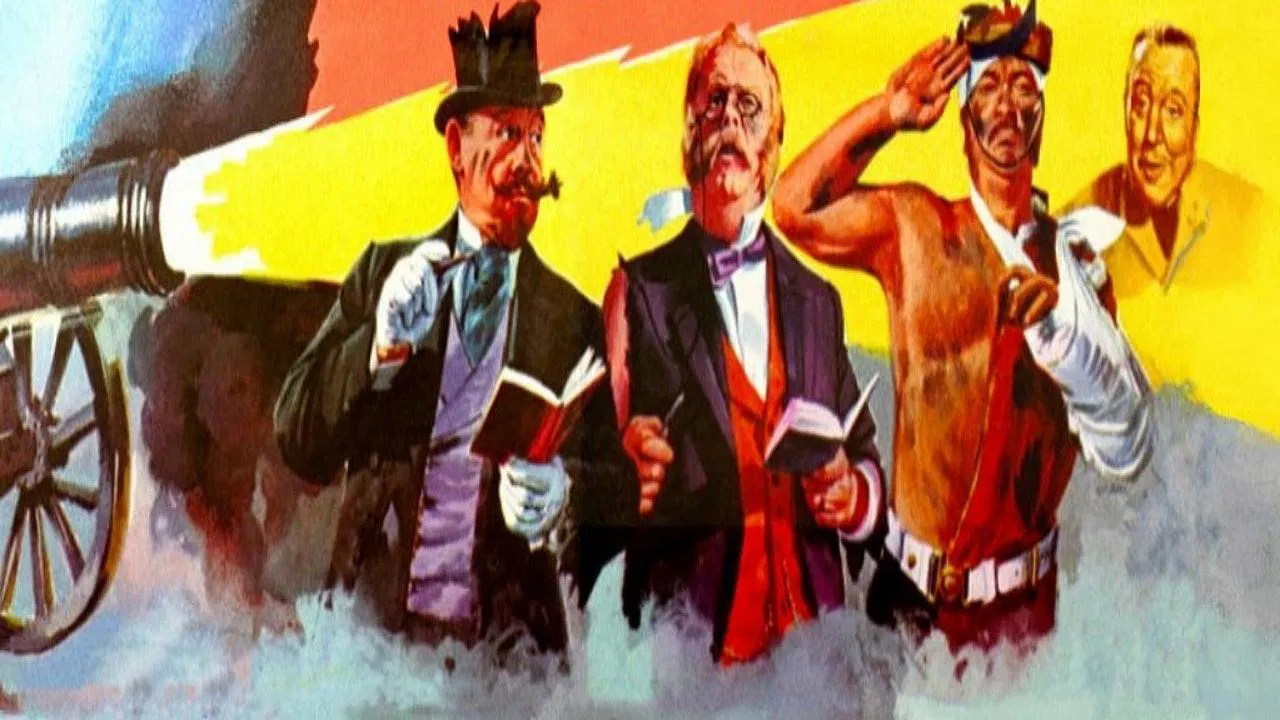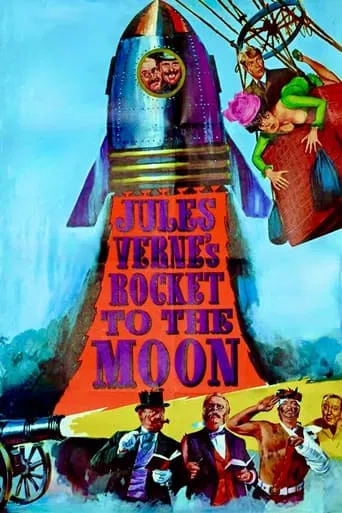

Very very predictable, including the post credit scene !!!
... View MoreGreat Film overall
... View Morebrilliant actors, brilliant editing
... View MoreIf you're interested in the topic at hand, you should just watch it and judge yourself because the reviews have gone very biased by people that didn't even watch it and just hate (or love) the creator. I liked it, it was well written, narrated, and directed and it was about a topic that interests me.
... View MoreHere is a 1967 British movie that is unsure whether it wants to be a straightforward 1890s Jules Verne fantasy, a 1960s farce or a romantic comedy. It uses the Jules Verne story as a reflection of the 1960s anxiety about the space race and the decline of Empire."Voyage to the Bottom of the Sea" and "Time Machine" are great 1960s films that remain watchable classics today. This one doesn't fall into that category at all. We see from the start that this is not just a send-up of Victorian science and engineering, but a parody of Victorian society in general. In the turbulent 1960s, the British Empire was in its death throes, and traditional British values and mannerisms were seen as fair game by movie makers.Some of the great lines: "By Jove, what a corker", "You're a cad and a bounder", "It's because of the colonies!" "Oh Grundle, what beastly hard luck" and "By George, this is splendid" (said by Burl Ives, no less). These lines were all delivered with great relish.However, the loving detail paid to these Victorian trappings adds a poignant air to it all. In the various elaborate scenes, they went to a lot of trouble to depict many different aspects of this British world in the 1890s. A British club, a Welsh village home, a picnic spread, local parades, and so on. The filmmakers seem to be saying, "Surely, it was a good thing while it lasted, even though we laugh at it now".In addition to the British self-mockery, foreigners are treated with disdain. The Americans are hucksters and pretty-boy astronauts. The French are flighty and unfaithful (but look good). The Russian is an inept spy lurking in the bushes who tries to ruin everything. The German is a mad scientist. All this is pure 1960s.Miscast Burl Ives isn't convincing as a fraudster; he plays himself: portly, amiable and handsome. Troy Donohue (at this point well into his personal and professional decline) delivers his lines with earnest woodenness. He wasn't gay, but it's hard not to snicker when Madeline cries out, "I love you, Gaylord I love you, Henri". At points like this, the film becomes a "Carry On" farce.British comedians Terry-Thomas and Lionel Jeffries were an amusing pair. Jeffries in particular -- playing a bitter, eccentric engineer -- gets to sink his teeth into some juicy lines. By the second half they had become the villains, and played it to the hilt.It is somewhat of a rambling, disjointed movie that revolves around set-piece scenes rather than a coherent plot. There are quite a few scenes that add nothing to plot development. We spend a full five minutes, for example, watching a nervous 19th century British artillery crew prepare to fire a dangerous cannon. (Explosions gone wrong are an important theme in the movie.) Another five minutes was devoted to a chase scene involving a Frenchwoman on a penny farthing bicycle. (The filmmakers had a genuine "gas carriage" as a prop, so they made full use of it.)"Rocket to the Moon" is a silly movie that has not stood the test of time. However, it is witty and fun at times. If you like this sort of thing, you might enjoy this one.
... View MoreIf you watch the dreadful FROM THE EARTH TO THE MOON with Joseph Cotten, George Sanders and some dreadful special effects, this little film looks so much better. On it's own, it has it's own set of virtues and faults. Too silly and trite for some of the jokes (the climactic chase the with always delightful Deliah Levi and the villains) is clumsy, some of the jokes stupid. And like so many American International films, it wants to be better than it actually is. MASTER OF THE WORLD comes to mind. The virtues is that the British films of this period emulating Victorian England were very beautifully done. THE WRONG BOX and THE ASSASSINATION BUREAU come to mind. The music is a highlight and it is almost impossible to find, at times, a happier little film than this one is in spots. The ending is a perfect ending to a tale long known by Jules Verne fans. Compared to THOSE MAGNIFICENT MEN and THE GREAT RACE, it comes of a poor second but still worth a viewing on Saturday or Sunday afternoon. Pleasant.
... View MoreJULES VERNE'S ROCKET TO THE MOON is immediately misleading on two out of three points. Firstly, as the opening credits swiftly admit, while the plot is inspired by the general writings of Verne, it is not in fact based on any particular story that he actually wrote, which makes the attribution somewhat spurious. Secondly, while there is a rocket in the film, it becomes increasingly apparent as the movie progresses that it is in no actual danger of going anywhere near the moon.Having cleared up the situation with the misleading title, one can sit back and enjoy an amusing romp that, despite its Victorian setting, is unique to the films produced in the swinging sixties. The typically contrived plot concerns a suddenly bankrupt Phineas T. Barnum (Burl Ives) making an escape from his creditors to England, where he becomes the prime mover in a plan to launch a rocket to the moon. On the side of the angels are a German explosives expert (Gert Fröbe), an idealistic young American (Troy Donahue) with a revolutionary rocket design and the well intentioned Duke of Barset (Dennis Price). Up to no good are an unscrupulous financier (Terry Thomas), an egotistical engineer (Lionel Jeffries) and a Russian spy (Joachim Teege). In characteristic fashion, it is around the central framework of the plot that all the amusing vignettes of the film are built. Terry Thomas' "economical" motor car, and Gert Fröbe's explosive experiments to find the right amount of lift to get the rocket into space are two humorous recurring bits.The film boasts another trademark of films of this era: a large cast filled with familiar faces. Gert Fröbe is great fun in his role as the fireproof Professor Von Bulow. Burl Ives, Terry Thomas and Lionel Jeffries also deliver the goods with their performances, though to be fair, their roles really require them to do little more than play upon already well established screen personas. The gorgeous Daliah Lavi is, well, gorgeous, as the female lead, which is pretty much all her part really calls for. Hermione Gingold, who amazingly is billed fourth in the credits, barely has time to deliver a performance in her five minutes on screen.Dennis Price is fine in a part that has a fair amount of screen time, but really doesn't require him to do much. Seeing Price in such undemanding roles is always a little sad when one remembers his brilliant turn in KIND HEARTS AND CORONETS. However Price's performance in ROCKET TO THE MOON is positively dynamic when compared to that of his American co-star, and supposedly the film's leading man, Troy Donahue. Donahue is one of the many handsome Hollywood hunks of the era, who looked great, but couldn't act their way out of a paper bag and he brings exactly that level of skill to his performance here. When surrounded by such a colourful cast it becomes painfully apparent just how out of his depth Donahue is.JULES VERNE'S ROCKET TO THE MOON is occasionally laugh out loud funny, but mainly delivers grins, smirks and guffaws. Unlike such similar and overlong fare as THE GREAT RACE, THOSE MAGNIFICENT MEN IN THEIR FLYING MACHINES or AROUND THE WORLD IN 80 DAYS, it keeps itself brief, does not wear out its welcome and makes for an ideal film to watch on a Sunday afternoon.Unfortunately, ROCKET TO THE MOON has been released in America on home video in only in pan and scan in a long out of print VHS release (under the ridiculous title THOSE FANTASTIC FLYING FOOLS). It is available in the UK in a quite acceptable 2.35:1 widescreen DVD release.
... View MoreIn the 1960s there was a new phenomenon in movie comedies: the comedy that included every known comic in the business, usually in some mad plot. America gave us IT'S A MAD, MAD, MAD, MAD WORLD,THE RUSSIANS ARE COMING, THE RUSSIANS ARE COMING!,and THE GREAT RACE. Britain gave us THOSE MAGNIFICENT MEN IN THEIR FLYING MACHINES and MONTE CARLO OR BUST. Both of those films dealt with speed contests (the 1910 London to Paris air contest, and the first Monte Carlo rally). Both had several comic actors in them (Terry-Thomas, Gert Frobe, Tony Hancock, Dudley Moore and Peter Cooke, Tony Curtis, Alberto Sordi). Then, in 1967, came THOSE FANTASTIC, FEARLESS, FLYING FOOLS (also known as ROCKET TO THE MOON). Like the other two films from England, it was a period piece, set in the 1870s. But the story is basically a transposed version of Jules Verne's FROM THE EARTH TO THE MOON. The original novel was set in Florida (oddly enough near modern day Cape Kennedy)after the American Civil War. In ROCKET TO THE MOON P.T. Barnum plans to build a "Columbiad" cannon inside a mountain in Wales, and have the moon capsule piloted by General Tom Thumb. Instead it becomes a British national issue, and a committee is formed headed by Dennis Price (the Duke of Barset - another literary borrowing, only from Anthony Trollope). Unfortunately Terry-Thomas and his business partner Lionel Jeffries are also involved in the committee, and they both see a chance to make money on this. Jeffries is the original capsule builder, but Barnum points out that Jeffries design only enables the capsule to go to the moon period. "Hold it laddy," intones Jeffries, "I was told to design a capsule to get a traveller to the moon...nobody said a word about getting him back." Jeffries is replaced. Subsequently Price discovers that Terry-Thomas has been gambling away the committee's money, and he is fired. Facing financial ruin, both men decide to sabotage the project. Gert Frobe, the inventor of the new explosive to use to send the vehicle to the moon, is a totally mad German scientist. His best moment in the film is a whimsical one. He has designed vocal semaphore devices that you speak through. This enables the two people who are communicating not to be heard and understood by anyone else, for the machines break down the words to syllables that are hard to understand. The other person, using the other semaphore (but winding it backwards)is supposed to reattach the syllables into an understandable set of words. Unfortunately, as Frobe discovers, the device does not quite work. "I can't understand a word he's saying.", a doubtful Frobe says.Actually Burl Ives and Terry Thomas have choice moments too. Ives accidentally stumbles on the site where some of Frobe's explosive is being tested, and desperately tries to break the fuse with a rock and his cane. Terry Thomas has designed an early automobile that runs on "gas" - meaning "neon" from street-lamps. Jeffries says that the whole nature of the vehicle is immoral - it runs on stolen gas! "That's not the point!", says Terry-Thomas, "It's very economical!"It is not a bad film, and can be a little enjoyable in its whimsy.
... View More